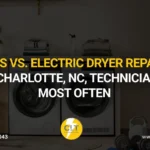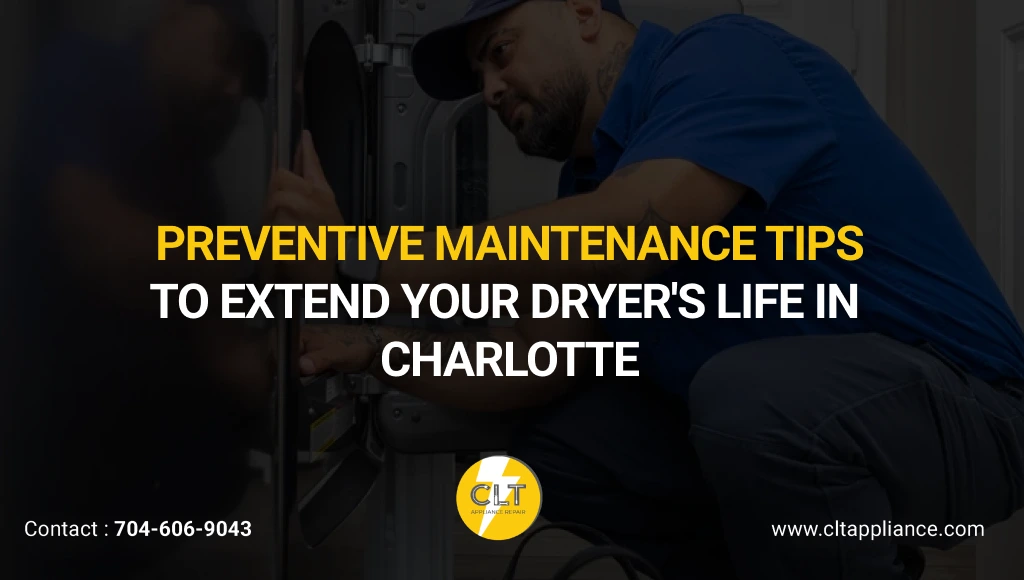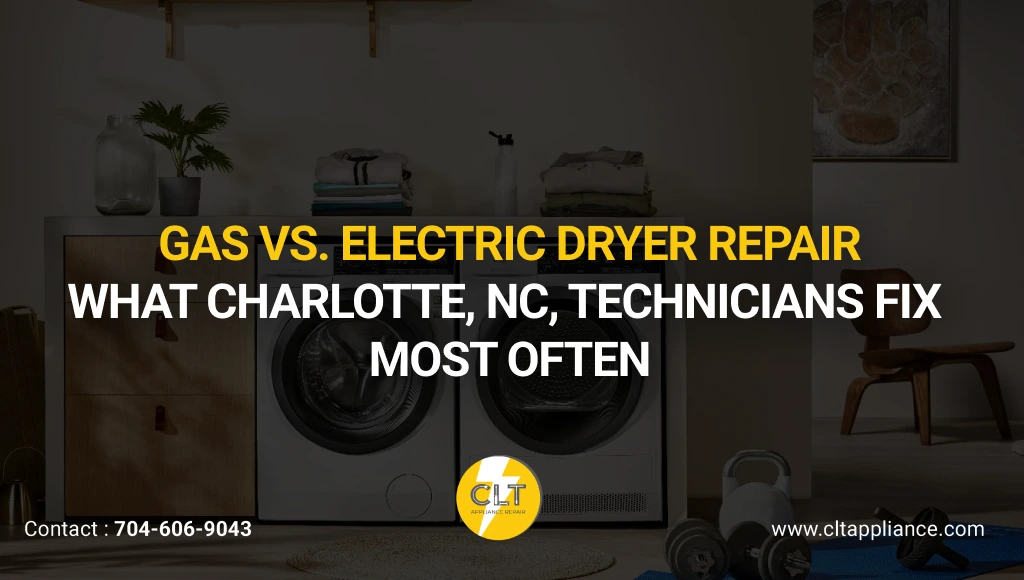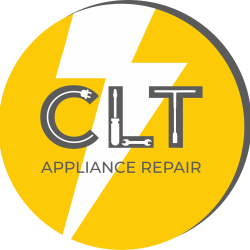The refrigerator stops cooling during the hottest week of summer. The washing machine leaves standing water after every cycle. The dryer runs endlessly without drying clothes. These problems strike Charlotte homes daily, turning simple tasks into major headaches. Charlotte’s humid climate and frequent power surges make appliances work harder and wear out faster. This guide covers the seven failures local technicians fix most often from refrigerators to stoves, plus the real causes behind each problem. Learn how appliance repair Charlotte professionals solve these issues and what homeowners can do to prevent future breakdowns.
Refrigerator problems don’t fix themselves. Charlotte’s certified technicians at CLT Appliance Repair arrive prepared with the right tools and parts to restore cooling fast.
What are the Most Common Appliance Failures in Charlotte Homes?
The most common appliance failures in Charlotte homes are refrigerators that stop cooling, washing machines that won’t drain or spin, dryers that take forever to dry clothes, dishwashers that leave dishes dirty, ovens that don’t heat properly, ice makers that stop making ice, and stove burners that won’t turn on. Charlotte’s humid weather and power surges make these problems happen more often than in other areas.
1. Refrigerator Not Cooling Properly
Nothing’s worse than opening the fridge to find everything warm. Milk goes bad, ice cream turns to soup, and groceries end up in the trash. This usually happens slowly. First things don’t stay as cold, then one day the whole fridge gives up.
Why It Happens
A few things usually cause cooling problems. The coils on the back or bottom get covered in dust and can’t release heat properly. Door seals get old and cracked, letting warm air sneak in. The fan that blows cold air around might stop working. Or the thermostat gets confused and doesn’t tell the fridge the right temperature. According to Consumer Reports’ data, analyzing 66,500 refrigerators, up to 33% of units require repairs within just 5 years of purchase, highlighting the prevalence of cooling failures.
How Technicians Fix It
First, technicians clean those dusty coils with a special vacuum. The door seal gets checked for tightness, as sometimes it only needs replacing. The fan gets tested to make sure it’s spinning. The thermostat gets tested with professional tools to see if it’s reading temperatures correctly. Most appliance repair Charlotte jobs in Charlotte, like this one, take about 45 to 90 minutes.
Charlotte Weather Makes It Worse
Charlotte’s hot, humid summers make refrigerators work extra hard. When it’s 95 degrees outside and muggy, fridges run almost constantly trying to stay cold inside. That’s why more fridges break down in July and August. Cleaning those coils twice a year really helps prevent summer breakdowns.
2. Washing Machine Not Draining or Spinning
A load of laundry finishes, and the washer opens to reveal a tub full of dirty water. Clothes are soaking wet and heavy. Or maybe the washer makes horrible grinding sounds when it tries to spin. Either way, laundry can’t move forward until it’s fixed.
What Causes This
- The drain pump gets clogged with coins, bobby pins, buttons, or lint
- The rubber belt that spins the drum wears out and starts slipping
- The lid switch breaks and thinks the lid is open, so it won’t spin
- The drain hose gets kinked or crushed behind the washer
How Experts Fix It
Technicians take off the washer panel to get to the pump and pull out whatever’s stuck in there. If the belt is worn out, it gets replaced, which means loosening the drum and putting a new belt around the pulleys. The lid switch gets tested with a meter to see if it’s working. After fixing everything, a test cycle runs to make sure it drains and spins properly.
3. Dryer Taking Too Long to Dry Clothes
The dryer runs and runs, but clothes stay damp. Towels need two or three cycles. Jeans are still wet at the seams. The dryer feels hot, but nothing’s actually drying. This wastes time and runs up the electric bill.
Why This Happens
- Lint builds up in the vent pipe and blocks airflow
- The heating element burns out and can’t generate enough heat
- The exhaust duct outside gets clogged or crushed
- The thermostat or safety fuse goes bad and cuts the heat
How Professionals Solve It:
Experts disconnect the dryer and clean out the entire vent from the dryer to the outside. Special brushes really scrub the duct walls clean. Then the heating element gets tested to see if it’s broken. If the thermostat or fuse is bad, those get replaced, too. Older Charlotte homes sometimes have really long vent runs that collect tons of lint, as those definitely need professional cleaning.
4. Dishwasher Not Draining or Leaving Dishes Dirty
The dishwasher finishes a cycle, and standing water sits at the bottom. Dishes still have food stuck on them. Glasses come out cloudy with white spots. When the dishwasher doesn’t drain right, that dirty water only recirculates and makes everything worse.
Common Problems
- The filter at the bottom gets clogged with food bits
- Spray arm holes get blocked, so water can’t spray properly
- The drain pump stops working and can’t pump water out
- Hard water minerals build up and clog the spray jets
How They Fix It
Technicians take out the filter and clean all the trapped food and gunk. The spray arms come off so each little hole can be cleared. Sometimes a toothpick or wire works to poke through stubborn clogs. The drain pump gets tested to see if it’s working. Charlotte’s water has lots of minerals that leave white crusty deposits, so those get cleaned off, or parts get replaced if they’re too clogged up.
5. Oven Not Heating or Baking Evenly
Cookies burn around the edges but stay raw in the middle. Casseroles take twice as long to cook. The oven says it’s 350 degrees, but it feels way cooler. These problems usually mean something’s broken with the heating parts or the temperature sensor.
What Usually Breaks
- The heating element at the bottom burns out and stops glowing
- The temperature sensor gets faulty and tells the oven the wrong temperature
- The oven’s control board needs recalibrating to read temperatures correctly
How Pros Fix It
Professionals look at the heating element first, and if it’s broken, the crack or burn mark usually shows. A special meter tests it to confirm it’s dead. The temperature sensor is a probe that sticks into the oven, which gets replaced if it’s reading wrong. Sometimes the oven only needs to be recalibrated through a hidden settings menu. Then it gets tested at different temperatures to make sure it’s working right.
Pro Tip:
Getting an oven checked in October before the holidays hit makes sense. Nothing’s worse than finding out the oven doesn’t work right when trying to cook Thanksgiving dinner. Early checkups catch problems before they ruin holiday cooking.
Holiday meals can’t wait for a broken oven. CLT Appliance Repair certified technicians carry heating elements and sensors on their trucks for immediate repairs across Charlotte.
6. Ice Maker Not Producing Ice
The ice bin stays empty no matter how long the wait. The normal water filling sounds never happen. Summer comes, and everyone wants ice, but the ice maker quits working. This problem can be tricky because several different parts have to work together to make ice.
Why Ice Makers Stop Working
- The water line freezes up and blocks water from getting to the ice maker
- The water valve that lets water in stops working
- The water filter gets clogged and doesn’t let enough water through
- The ice maker module itself breaks and won’t cycle
How They Address The Issue:
Experts check the fill tube first to see if it’s frozen solid. If it is, careful thawing happens. The water valve gets tested to make sure it’s getting power and actually opening. Changing the water filter often solves the problem; those should be changed every six months anyway. If the ice maker module is broken, it gets replaced. Checking the freezer temperature (between 0 and 5 degrees) also matters for ice making.
7. Stove Burner or Cooktop Not Heating
The knob turns, but nothing happens. Gas burners click and click without lighting. Electric burners stay cold and dark. When burners don’t work, cooking becomes impossible. Gas stoves and electric stoves break in completely different ways, so the fix depends on the type.
What Goes Wrong
For gas stoves:
- The igniter cracks and can’t make a spark anymore
- Food spills clog the little holes where gas comes out
For electric stoves:
- Wires get loose and lose their connection
- The control switch burns out and stops sending power
How Technicians Fix It
For gas stoves, technicians test the igniter to see if it’s pulling enough power. If it’s weak, it gets replaced. Those burner holes get cleaned out with a thin wire. For electric stoves, all the wire connections get checked, and anything loose gets tightened. If the switch is bad, it gets replaced. With gas repairs, leak checks always happen using a special solution to make sure everything’s safe. The flame should burn steadily and blue, which means it’s working right.
Takeaway
Local appliances take a daily beating. Knowing the seven most common failures helps homeowners spot problems early and prevent major breakdowns. Knowing the seven most common failures helps homeowners spot problems early. Regular cleaning and maintenance prevent most breakdowns before they happen. When something does go wrong, getting professional appliance repair Charlotte service right away fixes it fast and safely. The right repair at the right time makes appliances last years longer and saves thousands compared to buying new ones.
Appliances work hard every day. When they break, they need fixing right, not only patching up. CLT Appliance Repair brings experience fixing fridges, washers, dryers, dishwashers, ovens, and stoves all over Charlotte. Our licensed and insured technicians arrive prepared with the parts most homes need. Same-day service means no long waits. Real prices get shared upfront, no sneaky fees, no surprises. Every repair comes with a satisfaction guarantee. Charlotte families choose CLT because problems get fixed right the first time.
Frequently Asked Questions
What are the most common appliance failures in Charlotte homes?
The most common appliance failures in Charlotte include refrigerators not cooling, washers not draining, dryers taking too long to dry, dishwashers leaving dishes dirty, ovens not heating, ice makers failing to produce ice, and stove burners that won’t ignite properly. CLT Appliance Repair technicians handle these issues daily with fast, reliable fixes across Charlotte.
Why do home appliances break down so often?
Most appliances fail due to a combination of regular wear, lack of cleaning, overloading, skipped maintenance, and electrical surges common in humid regions like Charlotte. These factors gradually damage components until failure occurs.
How do I know if I should repair or replace my appliance?
If the repair costs are less than half the price of a new appliance and the unit is under its average lifespan, repair is the smarter choice. However, older or inefficient appliances may be better replaced to save on future maintenance costs.
What’s the average lifespan of major home appliances?
Refrigerators and dryers last around 13 years, washing machines about 10 years, dishwashers 9 years, and ovens or ranges 13–15 years, depending on usage and care. Proper maintenance extends these lifespans significantly.
Author

- John Bennett
- John Bennett is a seasoned appliance repair specialist at CLT Appliance Repair, where he brings over a decade of technical expertise and a strong commitment to customer satisfaction. With a background in electrical and mechanical systems, John has built a reputation for reliable, efficient, and honest repair services across a wide range of household appliances-including refrigerators, washing machines, ovens, and more.
Latest entries
News11/19/2025Why Your Dryer Smells Burnt: Common Causes & Fixes in Charlotte, NC
News11/19/2025Preventive Maintenance Tips to Extend Your Dryer’s Life in Charlotte
News11/18/2025Gas vs. Electric Dryer Repair: What Charlotte, NC, Technicians Fix Most Often
News11/18/2025Top 5 Signs Your Dryer Needs Professional Repair in Charlotte, NC









